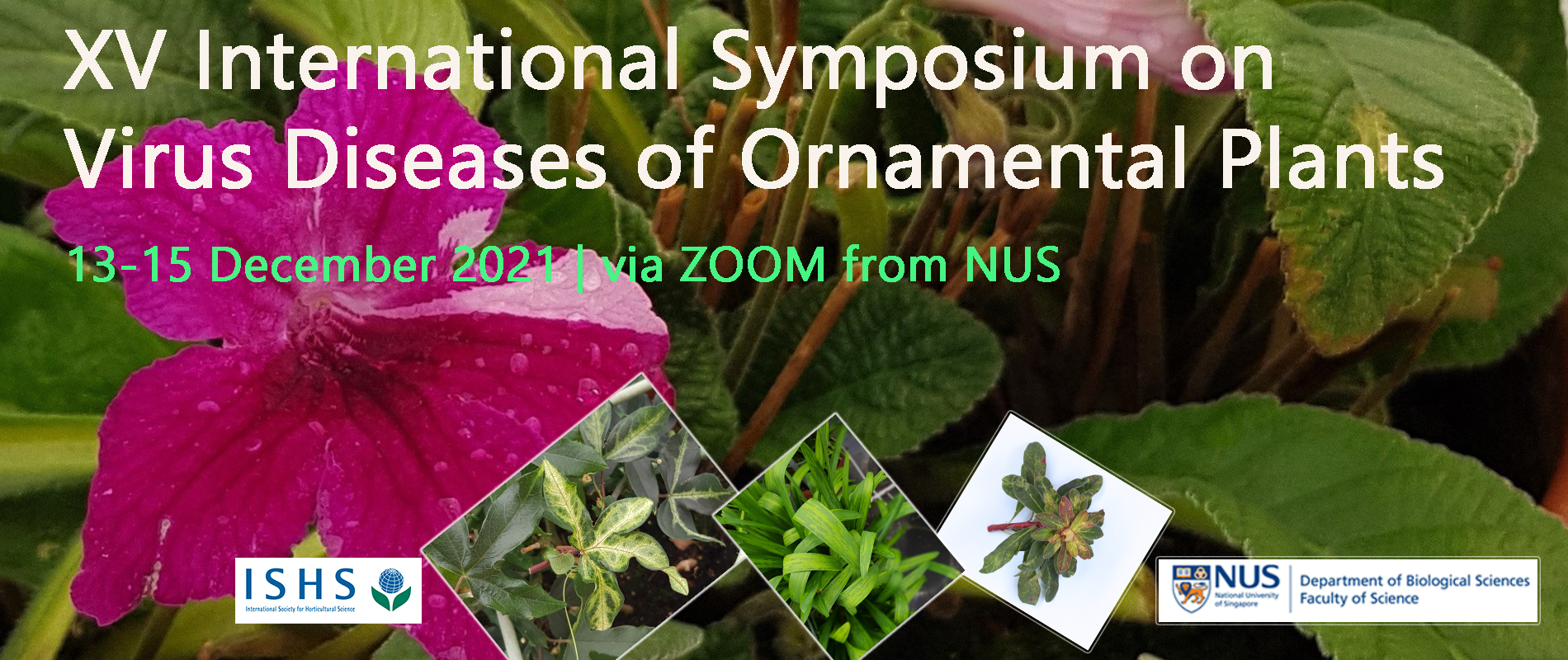
Introduction
The Virus Diseases of Ornamentals Working Group of the International Society for Horticultural Science is pleased to announce the XV International Symposium on Virus Diseases of Ornamental Plants, to be held as a fully virtual meeting. Two parallel sessions will occur in order to allow participants from all regions of the world to take part in whichever session is most convenient to their own time zone. All presentations will be pre-recorded, with questions and answers to be submitted electronically and available to all participants in either session, in order to allow all attendees to participate and benefit as fully as possible.
It is our goal to bring together as many virologists and plant pathologists working with or interested in viruses affecting ornamental plants as possible; by this means we hope to expand knowledge of the viruses found in the wide range of genera and species of plants grown as ornamentals around the world, and to increase interactions between scientists involved in the study of these viruses. International collaboration between scientists in countries exporting and importing ornamental plants may assist in early identification of emerging viruses, resulting in the ability to take preventive measures in production facilities to prevent spread and increase product quality for the mutual benefit of producers and consumers. This is of increasing importance as the ornamentals industry has become more and more a global business, with multiple countries involved in exploration of their flora, selection and breeding, production of seed or un-rooted cuttings for export, import and establishment of young plants, wholesaling, and finally retail sales to the ultimate consumers of cut flowers, potted plants, and bedding plants. This increasingly international trade inevitably leads to unwitting ‘sharing’ of some of the viruses associated especially with vegetatively-propagated ornamental plants, and occasional transmission of emerging viruses from ornamentals to more economically important agronomic crops. Another increasing trend in the industry is for an overlap between ornamental crops and vegetable transplants in the same production facilities, leading to the potential of either mechanical or vectored transmission of viruses between crop types. It is thus very much in the interests of scientists in both the exporting and importing countries to understand which viruses are emerging and may pose a threat to production of ornamentals, and possibly also to agronomic crops.
We hope that the fully virtual format of this meeting will allow many virologists and plant pathologists who have not previously participated in the normal in-person symposia on a four year interval , to participate in this year’s XV International Symposia on Virus Diseases of Ornamental Plants at the reduced cost made possible by the virtual format. We anticipate that the interactions resulting from participation will lead to at least some of the first-time participants to become collaborators with existing members of the group, and to attend future in-person symposia. Increased interactions between colleagues from different countries has proven very useful to the long-term members of the Virus Diseases of Ornamentals Working Group, and we hope that we will gain new colleagues who will also find such interactions valuable.
PLENARY SPEAKER

Professor Savithramma P Dinesh-Kumar
Department of Plant Biology and The Genome Center
College of Biological Sciences, University of California, Davis, USA
Virus-host interactions and gene editing using plant viruses
Nucleotide-binding leucine-rich repeat (NLR) class of immune receptors play a critical role in defense against pathogens in plants and animals. Viral NLRs such as N TIR-NLR from tobacco recognizes Tobacco mosaic virus (TMV) and activates immune signaling. The tobacco N NLR is a well-studied viral immune receptor that confers resistance to all strains of TMV except the Ob-strain. The N recognizes p50 kDa helicase domain (p50) within the TMV replicase and triggers immune signaling to restrict TMV to the infection site. N recognizes TMV in the cytoplasm and associates with the Squamosa Promoter-binding-protein-Like 6 (SPL6) transcription factor in the nucleus to activate defense against TMV. Although TIR domain-mediated dimerization of N post-TMV-p50 recognition is an early signaling event, but steps downstream of dimerization remain unknown. We will present our recent findings on the identification and characterization of new regulators of NLR-mediated viral defense.
Over the last 3-4 decades, plant viruses have been engineered for gene function studies in plants. More recently, plant viral vectors have been engineered to deliver gene editing components. I will discuss our efforts towards development of RNA viruses for the delivery of genome editing components.
| PROGRAM (updated 15 Dec 2021) |
|
| Welcome Address
by Dr. Margherita Beruto, |
|
|
Abstract and Manuscript Submission |
|
Abstract submission due date: 19 Nov 2021 |
Contact, Queries and Registration
| To download Contact and Query form |  |
| To download Registration form |  |
The registration fee includes presentation of up to two presentations per registration (but not the Abstract submission fee); the fee also includes an electronic copy of the Acta Horticulturae symposium proceedings.
| ISHS member†: | € 100 |
| Non-ISHS member†: | € 180 |
| Non-ISHS member†, Lower or Lower middle income country * | € 100 |
| Student | € 80 |
† Group leaders/Lead scientists – Please contact the convenors for additional information prior to submission of your registration; see link to ‘Contact’ form above
*As defined by the World Bank; see: WDI – The World by Income and Region (worldbank.org)
For all, prior to registering via ‘Registration’ tab, please read about ISHS membership: https://www.ishs.org/members
Students and junior scientists – please also view the information about ISHS Young Minds Awards: https://www.ishs.org/young-minds-award
Convenors
Dr. John Hammond (USDA, USA),
Dr. Sek-Man Wong (NUS)
Dr. Scott Adkins (USDA, USA)

